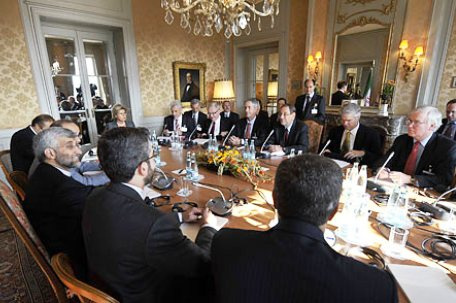Mistrust, the Core Problem in the Nuclear Saga

The time has come for the senior officials of the Islamic Republic of Iran and their nuclear negotiators to reassess Iran’s nuclear program as the upcoming negotiations promise a new opening in the nuclear saga.
In the West, there are two basic patterns regarding Iran’s nuclear program: the one that advocates a military approach, an inevitable option as is claimed, as Tehran is approaching the point of no return where it aquires the know how to build nuclear weapons --Israel’s PM Netanyahu and his Foreign Minister Lieberman, some Republican Americans including Mitt Romney, and fa -right European parties to name some.
The reasonable, moderate camp in the West, on the other side, believes that even a militar strike could not stop Iran’s nuclear progress and could exacerbate the situation in the Middle East. Iran has already mastered the uranium enrichment know how and even after a strike on nuclear sites suuch as Fordo and Natanz, Tehran would immediately begin to replace them with new nuclear sites. US President Barack Obama, some left-wing political leaders in Israel and the UK, and the socialist and liberal figues in France are part of this camp.
While both camps are at an equal state of power and influence at the moment, I believe that Tehran should not over-rely on the non-possibility of a miltiary strike. During the past two to three years, the scale has more or less tipped in favor of the pro-strike camp. Two years ago, Netanyahu could not extract any concessions from the US president for freezing plans to attack Iran, but in March 2012, we are witnessing how he seriously speaks of attacking Iran, only to stop the talk after Obama’s incentives (bunker-busters etc).
Iran is capable of constructing nuclear facilities anew even in case of destruction of its existing facilities by Israel, or it can strike Tel Aviv with its mid-range missiles, or target the US military in Iraq, Afghanistan and the Persian Gulf. It still enjoys the support of the majority of the Iranians, and a military strike would even side the opposition with the establishment. But this could not make up for the heavy blow our country would receive from the Kruz missiles which fly over the Persian Gulf to target our infrastructure and hinder our progress for years.
The best decision is to sit at the table of negotiations with the intent to reach a solid agreement. The basic complex of the story lies in the West’s suspicion towards Iran’s nuclear programs which, in their belief, is geared up for a nuclear weapons. Otherwise, no country is against Iran’s mastering of the civilian military technology. All the West wants is a guarantee, and what Tehran wants is unimpeded progress of its nuclear program and I see no conflicts between these two goals. Western countries, have even offered assistance in advancing Iran’s nuclear program.

